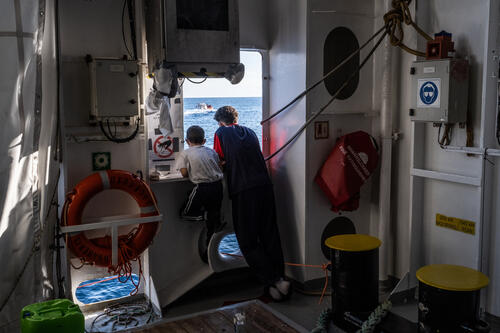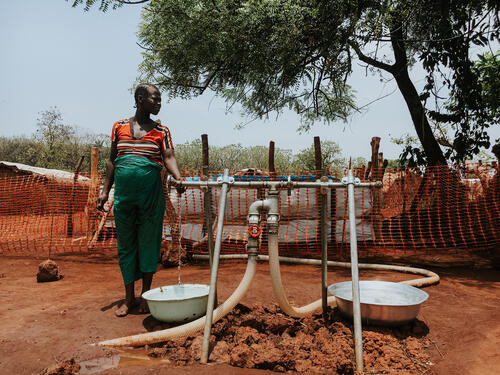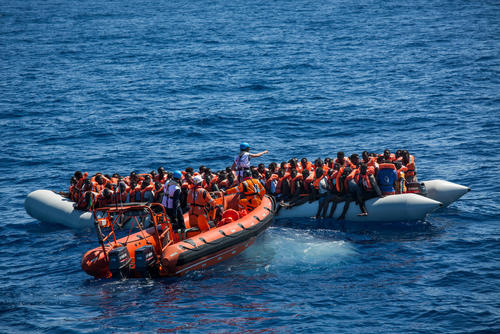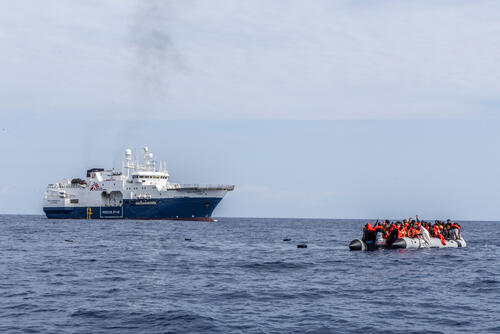On 16 November, Médecins Sans Frontières' search and rescue ship, the Geo Barents, responded to a distress call of a small wooden boat floating in the Central Mediterranean Sea. Our teams rescued 99 people; tragically, 10 people died, having been asphyxiated due to petrol fumes. Several days after the rescue, Geo Barent's communications manager, Candida Lobes, spoke to Moustafa*, a father travelling with his three sons, from Syria. Here she recounts their story.
Seven-year-old Ali* rushes to hold his father’s hand as soon as MSF rescuers help him out of the lifeboat and onto the deck of the Geo Barents, in the Central Mediterranean Sea. Moustafa, Ali’s father, limps.
I immediately think that it must be hard for him to stand after hours sitting in the same position on an overcrowded boat, and now with the Geo Barents swaying. But Ali helps him stand and holds him tight. When I reach them to help and put a thermal blanket around their shoulders, I notice some words written in pen in Arabic on Ali’s right arm.
“I feared I wouldn’t make it, so I wrote on Ali’s arm the name of his mother and her contact,” explains Moustafa. “She is in Syria. I hoped that if something had happened to me on that boat, someone could have taken care of my son and could have informed her.”
Moustafa tells me they left Libya the previous day, on the wooden boat from which they’ve just been rescued.
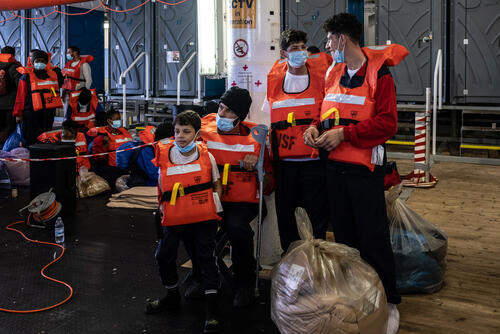
“When I saw all the people who were coming on board [in Libya], I realised that it was too crowded,” says Moustafa. “I was frightened, I wanted to get off the boat and I screamed to the smuggler to let us leave.”
Moustafa scans the deck of the Geo Barents to check that all three sons are safely together on board.
“It was too late,” Moustafa continues. “The man I paid to get on the boat yelled at me to stop and he threatened to kill my sons and me with his gun. We had no choice.”
Moustafa and his three sons are among the 99 survivors rescued by the MSF team on the Geo Barents on 16 November, during a difficult search and rescue operation, less than 30 nautical miles from the Libyan coast. The survivors recount that they left Zuwara, some 100 kilometres from Tripoli on the Libyan shore, in the late evening of 15 November on a cramped wooden boat. After a few miles at sea, the weather started deteriorating, the waves were becoming higher, and the engine stopped working.
“People were panicking, we had women and children on board, they were all scared and crying; many were sobbing, screaming and moving on the boat out of despair,” says Moustafa, keeping Ali, his youngest son, between his arms. “There was nothing I could do, just to pray to God for my sons to stay alive.”
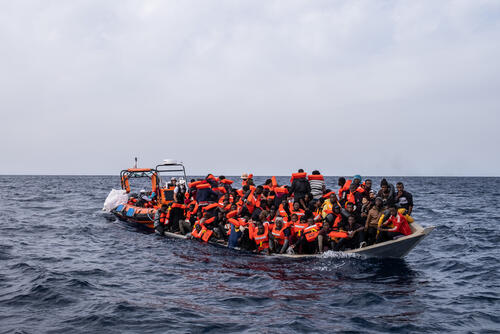
The wooden boat had 109 people on board, including Moustafa and his sons. When the Geo Barents reached the wooden boat in distress in the early afternoon, MSF teams rescued 99 people. They found the bodies of 10 people on the lower deck, thought to have suffocated from fuel fumes.
The survivors told us that these people had spent more than 13 hours on the cramped lower deck of the boat. Some of the people on the boat had not realised what was happening to their friends or family members on the lower deck; others had to travel for hours next to the bodies of their fellow travellers.
Many of the people rescued that day have survived a series of traumatic events throughout their journeys, and their experience on the boat is only the latest. Whatever the reasons that pushed them to leave their place of origin, and whenever they leave, there is always a common element in their accounts: the experience of violence, deprivation and the heart-wrenching fear for their lives and their loved ones.
“I don’t have wishes for my life anymore; I just want a good life for my sons, I want them to be safe and I want them to finally have a good education,” says Moustafa, sitting in pain on the ground.
Moustafa has a metal internal fixator on his right leg that makes him limp. He says he has been in pain since 2011, when his leg was severely injured in Syria and the doctors needed to attach the fixator.
“[Armed men] came for me while I was in my shop. They locked the door, they repeatedly beat me with the butt of their rifles, and with whatever they found,” says Moustafa, showing me a long scar still visible on his head. “I fell unconscious, they thought I was dead. A few hours later, I woke up in an empty street, behind some abandoned buildings, with a broken leg and covered in my own blood.”
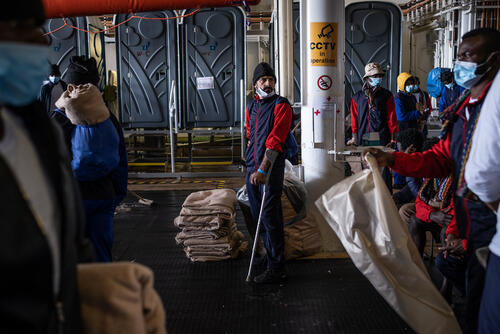
Moustafa is from Babbila, a southern suburb of Damascus that was under a four-year siege during the conflict in Syria, which started in 2011. When the siege was lifted in 2015, he decided to flee the war with his three sons. Ali was only one-year-old at that time.
Their journey has been long and difficult since: the family spent almost a month in Sudan and then they moved to Egypt, where their living conditions were tough. In September 2021, jobless and with only expired passports, Moustafa made the difficult decision to go to Libya and attempt to cross the Mediterranean Sea.
He hoped to give his sons at least a chance to attend school. The family crossed the border from Egypt to Libya; they went through Benghazi and Tripoli, then to Sabratah and Zuwara to find the boat from which the Geo Barents rescued them.
It is hard for me to comprehend that a child such as Ali, with his incredibly gentle smile and his kindness, has spent his whole life fleeing. It is impossible for me to accept that a caring father was left with no other choice than to risk his sons’ lives on a boat in the Mediterranean just to let them attend school safely. This is the shameful reality unfolding at European borders, where irresponsible and reckless migration policies condemn people like Moustafa and his family to risk their lives.
An estimated 1,303 people have died or gone missing while attempting the dangerous journey across the Central Mediterranean in 2021, including children. Some 22,825 people have died or gone missing on this same route since 2014.<p><span lang="EN-US" style="font-size: 9.0pt; line-height: 107%; font-family: 'Calibri',sans-serif; mso-ascii-theme-font: minor-latin; mso-fareast-font-family: Calibri; mso-fareast-theme-font: minor-latin; mso-hansi-theme-font: minor-latin; mso-bidi-font-family: 'Times New Roman'; mso-bidi-theme-font: minor-bidi; mso-ansi-language: EN-US; mso-fareast-language: EN-US; mso-bidi-language: AR-SA;">Source : </span><span lang="EN-US" style="font-size: 11.0pt; line-height: 107%; font-family: 'Calibri',sans-serif; mso-ascii-theme-font: minor-latin; mso-fareast-font-family: Calibri; mso-fareast-theme-font: minor-latin; mso-hansi-theme-font: minor-latin; mso-bidi-font-family: 'Times New Roman'; mso-bidi-theme-font: minor-bidi; mso-ansi-language: EN-US; mso-fareast-language: EN-US; mso-bidi-language: AR-SA;"><a href="https://missingmigrants.iom.int/region/mediterranean?region_incident=All&route=3861&month=All"><span style="font-size: 9.0pt; line-height: 107%; color: blue;">Mediterranean | Missing Migrants Project (iom.int)</span></a></span><!-- [if gte mso 9]><xml> <o:OfficeDocumentSettings> <o:AllowPNG/> </o:OfficeDocumentSettings> </xml><![endif]--><!-- [if gte mso 9]><xml> <w:WordDocument> <w:View>Normal</w:View> <w:Zoom>0</w:Zoom> <w:TrackMoves/> <w:TrackFormatting/> <w:PunctuationKerning/> <w:ValidateAgainstSchemas/> <w:SaveIfXMLInvalid>false</w:SaveIfXMLInvalid> <w:IgnoreMixedContent>false</w:IgnoreMixedContent> <w:AlwaysShowPlaceholderText>false</w:AlwaysShowPlaceholderText> <w:DoNotPromoteQF/> <w:LidThemeOther>EN-US</w:LidThemeOther> <w:LidThemeAsian>X-NONE</w:LidThemeAsian> <w:LidThemeComplexScript>X-NONE</w:LidThemeComplexScript> <w:Compatibility> <w:BreakWrappedTables/> <w:SnapToGridInCell/> <w:WrapTextWithPunct/> <w:UseAsianBreakRules/> <w:DontGrowAutofit/> <w:SplitPgBreakAndParaMark/> <w:EnableOpenTypeKerning/> <w:DontFlipMirrorIndents/> <w:OverrideTableStyleHps/> </w:Compatibility> <m:mathPr> <m:mathFont m:val="Cambria Math"/> <m:brkBin m:val="before"/> <m:brkBinSub m:val="--"/> <m:smallFrac m:val="off"/> <m:dispDef/> <m:lMargin m:val="0"/> <m:rMargin m:val="0"/> <m:defJc m:val="centerGroup"/> <m:wrapIndent m:val="1440"/> <m:intLim m:val="subSup"/> <m:naryLim m:val="undOvr"/> </m:mathPr></w:WordDocument> </xml><![endif]--><!-- [if gte mso 9]><xml> <w:LatentStyles DefLockedState="false" DefUnhideWhenUsed="false" DefSemiHidden="false" DefQFormat="false" DefPriority="99" LatentStyleCount="377"> <w:LsdException Locked="false" Priority="0" QFormat="true" Name="Normal"/> <w:LsdException Locked="false" Priority="9" QFormat="true" Name="heading 1"/> <w:LsdException Locked="false" Priority="9" SemiHidden="true" UnhideWhenUsed="true" QFormat="true" Name="heading 2"/> <w:LsdException Locked="false" Priority="9" SemiHidden="true" UnhideWhenUsed="true" QFormat="true" Name="heading 3"/> <w:LsdException Locked="false" Priority="9" SemiHidden="true" UnhideWhenUsed="true" QFormat="true" Name="heading 4"/> <w:LsdException Locked="false" Priority="9" SemiHidden="true" UnhideWhenUsed="true" QFormat="true" Name="heading 5"/> <w:LsdException Locked="false" Priority="9" SemiHidden="true" UnhideWhenUsed="true" QFormat="true" Name="heading 6"/> <w:LsdException Locked="false" Priority="9" SemiHidden="true" UnhideWhenUsed="true" QFormat="true" Name="heading 7"/> <w:LsdException Locked="false" Priority="9" SemiHidden="true" UnhideWhenUsed="true" QFormat="true" Name="heading 8"/> <w:LsdException Locked="false" Priority="9" SemiHidden="true" UnhideWhenUsed="true" QFormat="true" Name="heading 9"/> <w:LsdException Locked="false" SemiHidden="true" UnhideWhenUsed="true" Name="index 1"/> <w:LsdException Locked="false" SemiHidden="true" UnhideWhenUsed="true" Name="index 2"/> <w:LsdException Locked="false" SemiHidden="true" UnhideWhenUsed="true" Name="index 3"/> <w:LsdException Locked="false" SemiHidden="true" UnhideWhenUsed="true" Name="index 4"/> <w:LsdException Locked="false" SemiHidden="true" UnhideWhenUsed="true" Name="index 5"/> <w:LsdException Locked="false" SemiHidden="true" UnhideWhenUsed="true" Name="index 6"/> <w:LsdException Locked="false" SemiHidden="true" UnhideWhenUsed="true" Name="index 7"/> <w:LsdException Locked="false" SemiHidden="true" UnhideWhenUsed="true" Name="index 8"/> <w:LsdException Locked="false" SemiHidden="true" UnhideWhenUsed="true" Name="index 9"/> <w:LsdException Locked="false" Priority="39" SemiHidden="true" UnhideWhenUsed="true" Name="toc 1"/> <w:LsdException Locked="false" Priority="39" SemiHidden="true" UnhideWhenUsed="true" Name="toc 2"/> <w:LsdException Locked="false" Priority="39" SemiHidden="true" UnhideWhenUsed="true" Name="toc 3"/> <w:LsdException Locked="false" Priority="39" SemiHidden="true" UnhideWhenUsed="true" Name="toc 4"/> <w:LsdException Locked="false" Priority="39" SemiHidden="true" UnhideWhenUsed="true" Name="toc 5"/> <w:LsdException Locked="false" Priority="39" SemiHidden="true" UnhideWhenUsed="true" Name="toc 6"/> <w:LsdException Locked="false" Priority="39" SemiHidden="true" UnhideWhenUsed="true" Name="toc 7"/> <w:LsdException Locked="false" Priority="39" SemiHidden="true" UnhideWhenUsed="true" Name="toc 8"/> <w:LsdException Locked="false" Priority="39" SemiHidden="true" UnhideWhenUsed="true" Name="toc 9"/> <w:LsdException Locked="false" SemiHidden="true" UnhideWhenUsed="true" Name="Normal Indent"/> <w:LsdException Locked="false" SemiHidden="true" UnhideWhenUsed="true" Name="footnote text"/> <w:LsdException Locked="false" SemiHidden="true" UnhideWhenUsed="true" Name="annotation text"/> <w:LsdException Locked="false" SemiHidden="true" UnhideWhenUsed="true" Name="header"/> <w:LsdException Locked="false" SemiHidden="true" UnhideWhenUsed="true" Name="footer"/> <w:LsdException Locked="false" SemiHidden="true" UnhideWhenUsed="true" Name="index heading"/> <w:LsdException Locked="false" Priority="35" SemiHidden="true" UnhideWhenUsed="true" QFormat="true" Name="caption"/> <w:LsdException Locked="false" SemiHidden="true" UnhideWhenUsed="true" Name="table of figures"/> <w:LsdException Locked="false" SemiHidden="true" UnhideWhenUsed="true" Name="envelope address"/> <w:LsdException Locked="false" SemiHidden="true" UnhideWhenUsed="true" Name="envelope return"/> <w:LsdException Locked="false" SemiHidden="true" UnhideWhenUsed="true" Name="footnote reference"/> <w:LsdException Locked="false" SemiHidden="true" UnhideWhenUsed="true" Name="annotation reference"/> <w:LsdException Locked="false" SemiHidden="true" UnhideWhenUsed="true" Name="line number"/> <w:LsdException Locked="false" SemiHidden="true" UnhideWhenUsed="true" Name="page number"/> <w:LsdException Locked="false" SemiHidden="true" UnhideWhenUsed="true" Name="endnote reference"/> <w:LsdException Locked="false" SemiHidden="true" UnhideWhenUsed="true" Name="endnote text"/> <w:LsdException Locked="false" SemiHidden="true" UnhideWhenUsed="true" Name="table of authorities"/> <w:LsdException Locked="false" SemiHidden="true" UnhideWhenUsed="true" Name="macro"/> <w:LsdException Locked="false" SemiHidden="true" UnhideWhenUsed="true" Name="toa heading"/> <w:LsdException Locked="false" SemiHidden="true" UnhideWhenUsed="true" Name="List"/> <w:LsdException Locked="false" SemiHidden="true" UnhideWhenUsed="true" Name="List Bullet"/> <w:LsdException Locked="false" SemiHidden="true" UnhideWhenUsed="true" Name="List Number"/> <w:LsdException Locked="false" SemiHidden="true" UnhideWhenUsed="true" Name="List 2"/> <w:LsdException Locked="false" SemiHidden="true" UnhideWhenUsed="true" Name="List 3"/> <w:LsdException Locked="false" SemiHidden="true" UnhideWhenUsed="true" Name="List 4"/> <w:LsdException Locked="false" SemiHidden="true" UnhideWhenUsed="true" Name="List 5"/> <w:LsdException Locked="false" SemiHidden="true" UnhideWhenUsed="true" Name="List Bullet 2"/> <w:LsdException Locked="false" SemiHidden="true" UnhideWhenUsed="true" Name="List Bullet 3"/> <w:LsdException Locked="false" SemiHidden="true" UnhideWhenUsed="true" Name="List Bullet 4"/> <w:LsdException Locked="false" SemiHidden="true" UnhideWhenUsed="true" Name="List Bullet 5"/> <w:LsdException Locked="false" SemiHidden="true" UnhideWhenUsed="true" Name="List Number 2"/> <w:LsdException Locked="false" SemiHidden="true" UnhideWhenUsed="true" Name="List Number 3"/> <w:LsdException Locked="false" SemiHidden="true" UnhideWhenUsed="true" Name="List Number 4"/> <w:LsdException Locked="false" SemiHidden="true" UnhideWhenUsed="true" Name="List Number 5"/> <w:LsdException Locked="false" Priority="10" QFormat="true" Name="Title"/> <w:LsdException Locked="false" SemiHidden="true" UnhideWhenUsed="true" Name="Closing"/> <w:LsdException Locked="false" SemiHidden="true" UnhideWhenUsed="true" Name="Signature"/> <w:LsdException Locked="false" Priority="1" SemiHidden="true" UnhideWhenUsed="true" Name="Default Paragraph Font"/> <w:LsdException Locked="false" SemiHidden="true" UnhideWhenUsed="true" Name="Body Text"/> <w:LsdException Locked="false" SemiHidden="true" UnhideWhenUsed="true" Name="Body Text Indent"/> <w:LsdException Locked="false" SemiHidden="true" UnhideWhenUsed="true" Name="List Continue"/> <w:LsdException Locked="false" SemiHidden="true" UnhideWhenUsed="true" Name="List Continue 2"/> <w:LsdException Locked="false" SemiHidden="true" UnhideWhenUsed="true" Name="List Continue 3"/> <w:LsdException Locked="false" SemiHidden="true" UnhideWhenUsed="true" Name="List Continue 4"/> <w:LsdException Locked="false" SemiHidden="true" UnhideWhenUsed="true" Name="List Continue 5"/> <w:LsdException Locked="false" SemiHidden="true" UnhideWhenUsed="true" Name="Message Header"/> <w:LsdException Locked="false" Priority="11" QFormat="true" Name="Subtitle"/> <w:LsdException Locked="false" SemiHidden="true" UnhideWhenUsed="true" Name="Salutation"/> <w:LsdException Locked="false" SemiHidden="true" UnhideWhenUsed="true" Name="Date"/> <w:LsdException Locked="false" SemiHidden="true" UnhideWhenUsed="true" Name="Body Text First Indent"/> <w:LsdException Locked="false" SemiHidden="true" UnhideWhenUsed="true" Name="Body Text First Indent 2"/> <w:LsdException Locked="false" SemiHidden="true" UnhideWhenUsed="true" Name="Note Heading"/> <w:LsdException Locked="false" SemiHidden="true" UnhideWhenUsed="true" Name="Body Text 2"/> <w:LsdException Locked="false" SemiHidden="true" UnhideWhenUsed="true" Name="Body Text 3"/> <w:LsdException Locked="false" SemiHidden="true" UnhideWhenUsed="true" Name="Body Text Indent 2"/> <w:LsdException Locked="false" SemiHidden="true" UnhideWhenUsed="true" Name="Body Text Indent 3"/> <w:LsdException Locked="false" SemiHidden="true" UnhideWhenUsed="true" Name="Block Text"/> <w:LsdException Locked="false" SemiHidden="true" UnhideWhenUsed="true" Name="Hyperlink"/> <w:LsdException Locked="false" SemiHidden="true" UnhideWhenUsed="true" Name="FollowedHyperlink"/> <w:LsdException Locked="false" Priority="22" QFormat="true" Name="Strong"/> <w:LsdException Locked="false" Priority="20" QFormat="true" Name="Emphasis"/> <w:LsdException Locked="false" SemiHidden="true" UnhideWhenUsed="true" Name="Document Map"/> <w:LsdException Locked="false" SemiHidden="true" UnhideWhenUsed="true" Name="Plain Text"/> <w:LsdException Locked="false" SemiHidden="true" UnhideWhenUsed="true" Name="E-mail Signature"/> <w:LsdException Locked="false" SemiHidden="true" UnhideWhenUsed="true" Name="HTML Top of Form"/> <w:LsdException Locked="false" SemiHidden="true" UnhideWhenUsed="true" Name="HTML Bottom of Form"/> <w:LsdException Locked="false" SemiHidden="true" UnhideWhenUsed="true" Name="Normal (Web)"/> <w:LsdException Locked="false" SemiHidden="true" UnhideWhenUsed="true" Name="HTML Acronym"/> <w:LsdException Locked="false" SemiHidden="true" UnhideWhenUsed="true" Name="HTML Address"/> <w:LsdException Locked="false" SemiHidden="true" UnhideWhenUsed="true" Name="HTML Cite"/> <w:LsdException Locked="false" SemiHidden="true" UnhideWhenUsed="true" Name="HTML Code"/> <w:LsdException Locked="false" SemiHidden="true" UnhideWhenUsed="true" Name="HTML Definition"/> <w:LsdException Locked="false" SemiHidden="true" UnhideWhenUsed="true" Name="HTML Keyboard"/> <w:LsdException Locked="false" SemiHidden="true" UnhideWhenUsed="true" Name="HTML Preformatted"/> <w:LsdException Locked="false" SemiHidden="true" UnhideWhenUsed="true" Name="HTML Sample"/> <w:LsdException Locked="false" SemiHidden="true" UnhideWhenUsed="true" Name="HTML Typewriter"/> <w:LsdException Locked="false" SemiHidden="true" UnhideWhenUsed="true" Name="HTML Variable"/> <w:LsdException Locked="false" SemiHidden="true" UnhideWhenUsed="true" Name="Normal Table"/> <w:LsdException Locked="false" SemiHidden="true" UnhideWhenUsed="true" Name="annotation subject"/> <w:LsdException Locked="false" SemiHidden="true" UnhideWhenUsed="true" Name="No List"/> <w:LsdException Locked="false" SemiHidden="true" UnhideWhenUsed="true" Name="Outline List 1"/> <w:LsdException Locked="false" SemiHidden="true" UnhideWhenUsed="true" Name="Outline List 2"/> <w:LsdException Locked="false" SemiHidden="true" UnhideWhenUsed="true" Name="Outline List 3"/> <w:LsdException Locked="false" SemiHidden="true" UnhideWhenUsed="true" Name="Table Simple 1"/> <w:LsdException Locked="false" SemiHidden="true" UnhideWhenUsed="true" Name="Table Simple 2"/> <w:LsdException Locked="false" SemiHidden="true" UnhideWhenUsed="true" Name="Table Simple 3"/> <w:LsdException Locked="false" SemiHidden="true" UnhideWhenUsed="true" Name="Table Classic 1"/> <w:LsdException Locked="false" SemiHidden="true" UnhideWhenUsed="true" Name="Table Classic 2"/> <w:LsdException Locked="false" SemiHidden="true" UnhideWhenUsed="true" Name="Table Classic 3"/> <w:LsdException Locked="false" SemiHidden="true" UnhideWhenUsed="true" Name="Table Classic 4"/> <w:LsdException Locked="false" SemiHidden="true" UnhideWhenUsed="true" Name="Table Colorful 1"/> <w:LsdException Locked="false" SemiHidden="true" UnhideWhenUsed="true" Name="Table Colorful 2"/> <w:LsdException Locked="false" SemiHidden="true" UnhideWhenUsed="true" Name="Table Colorful 3"/> <w:LsdException Locked="false" SemiHidden="true" UnhideWhenUsed="true" Name="Table Columns 1"/> <w:LsdException Locked="false" SemiHidden="true" UnhideWhenUsed="true" Name="Table Columns 2"/> <w:LsdException Locked="false" SemiHidden="true" UnhideWhenUsed="true" Name="Table Columns 3"/> <w:LsdException Locked="false" SemiHidden="true" UnhideWhenUsed="true" Name="Table Columns 4"/> <w:LsdException Locked="false" SemiHidden="true" UnhideWhenUsed="true" Name="Table Columns 5"/> <w:LsdException Locked="false" SemiHidden="true" UnhideWhenUsed="true" Name="Table Grid 1"/> <w:LsdException Locked="false" SemiHidden="true" UnhideWhenUsed="true" Name="Table Grid 2"/> <w:LsdException Locked="false" SemiHidden="true" UnhideWhenUsed="true" Name="Table Grid 3"/> <w:LsdException Locked="false" SemiHidden="true" UnhideWhenUsed="true" Name="Table Grid 4"/> <w:LsdException Locked="false" SemiHidden="true" UnhideWhenUsed="true" Name="Table Grid 5"/> <w:LsdException Locked="false" SemiHidden="true" UnhideWhenUsed="true" Name="Table Grid 6"/> <w:LsdException Locked="false" SemiHidden="true" UnhideWhenUsed="true" Name="Table Grid 7"/> <w:LsdException Locked="false" SemiHidden="true" UnhideWhenUsed="true" Name="Table Grid 8"/> <w:LsdException Locked="false" SemiHidden="true" UnhideWhenUsed="true" Name="Table List 1"/> <w:LsdException Locked="false" SemiHidden="true" UnhideWhenUsed="true" Name="Table List 2"/> <w:LsdException Locked="false" SemiHidden="true" UnhideWhenUsed="true" Name="Table List 3"/> <w:LsdException Locked="false" SemiHidden="true" UnhideWhenUsed="true" Name="Table List 4"/> <w:LsdException Locked="false" SemiHidden="true" UnhideWhenUsed="true" Name="Table List 5"/> <w:LsdException Locked="false" SemiHidden="true" UnhideWhenUsed="true" Name="Table List 6"/> <w:LsdException Locked="false" SemiHidden="true" UnhideWhenUsed="true" Name="Table List 7"/> <w:LsdException Locked="false" SemiHidden="true" UnhideWhenUsed="true" Name="Table List 8"/> <w:LsdException Locked="false" SemiHidden="true" UnhideWhenUsed="true" Name="Table 3D effects 1"/> <w:LsdException Locked="false" SemiHidden="true" UnhideWhenUsed="true" Name="Table 3D effects 2"/> <w:LsdException Locked="false" SemiHidden="true" UnhideWhenUsed="true" Name="Table 3D effects 3"/> <w:LsdException Locked="false" SemiHidden="true" UnhideWhenUsed="true" Name="Table Contemporary"/> <w:LsdException Locked="false" SemiHidden="true" UnhideWhenUsed="true" Name="Table Elegant"/> <w:LsdException Locked="false" SemiHidden="true" UnhideWhenUsed="true" Name="Table Professional"/> <w:LsdException Locked="false" SemiHidden="true" UnhideWhenUsed="true" Name="Table Subtle 1"/> <w:LsdException Locked="false" SemiHidden="true" UnhideWhenUsed="true" Name="Table Subtle 2"/> <w:LsdException Locked="false" SemiHidden="true" UnhideWhenUsed="true" Name="Table Web 1"/> <w:LsdException Locked="false" SemiHidden="true" UnhideWhenUsed="true" Name="Table Web 2"/> <w:LsdException Locked="false" SemiHidden="true" UnhideWhenUsed="true" Name="Table Web 3"/> <w:LsdException Locked="false" SemiHidden="true" UnhideWhenUsed="true" Name="Balloon Text"/> <w:LsdException Locked="false" Priority="39" Name="Table Grid"/> <w:LsdException Locked="false" SemiHidden="true" UnhideWhenUsed="true" Name="Table Theme"/> <w:LsdException Locked="false" SemiHidden="true" Name="Placeholder Text"/> <w:LsdException Locked="false" Priority="1" QFormat="true" Name="No Spacing"/> <w:LsdException Locked="false" Priority="60" Name="Light Shading"/> <w:LsdException Locked="false" Priority="61" Name="Light List"/> <w:LsdException Locked="false" Priority="62" Name="Light Grid"/> <w:LsdException Locked="false" Priority="63" Name="Medium Shading 1"/> <w:LsdException Locked="false" Priority="64" Name="Medium Shading 2"/> <w:LsdException Locked="false" Priority="65" Name="Medium List 1"/> <w:LsdException Locked="false" Priority="66" Name="Medium List 2"/> <w:LsdException Locked="false" Priority="67" Name="Medium Grid 1"/> <w:LsdException Locked="false" Priority="68" Name="Medium Grid 2"/> <w:LsdException Locked="false" Priority="69" Name="Medium Grid 3"/> <w:LsdException Locked="false" Priority="70" Name="Dark List"/> <w:LsdException Locked="false" Priority="71" Name="Colorful Shading"/> <w:LsdException Locked="false" Priority="72" Name="Colorful List"/> <w:LsdException Locked="false" Priority="73" Name="Colorful Grid"/> <w:LsdException Locked="false" Priority="60" Name="Light Shading Accent 1"/> <w:LsdException Locked="false" Priority="61" Name="Light List Accent 1"/> <w:LsdException Locked="false" Priority="62" Name="Light Grid Accent 1"/> <w:LsdException Locked="false" Priority="63" Name="Medium Shading 1 Accent 1"/> <w:LsdException Locked="false" Priority="64" Name="Medium Shading 2 Accent 1"/> <w:LsdException Locked="false" Priority="65" Name="Medium List 1 Accent 1"/> <w:LsdException Locked="false" SemiHidden="true" Name="Revision"/> <w:LsdException Locked="false" Priority="34" QFormat="true" Name="List Paragraph"/> <w:LsdException Locked="false" Priority="29" QFormat="true" Name="Quote"/> <w:LsdException Locked="false" Priority="30" QFormat="true" Name="Intense Quote"/> <w:LsdException Locked="false" Priority="66" Name="Medium List 2 Accent 1"/> <w:LsdException Locked="false" Priority="67" Name="Medium Grid 1 Accent 1"/> <w:LsdException Locked="false" Priority="68" Name="Medium Grid 2 Accent 1"/> <w:LsdException Locked="false" Priority="69" Name="Medium Grid 3 Accent 1"/> <w:LsdException Locked="false" Priority="70" Name="Dark List Accent 1"/> <w:LsdException Locked="false" Priority="71" Name="Colorful Shading Accent 1"/> <w:LsdException Locked="false" Priority="72" Name="Colorful List Accent 1"/> <w:LsdException Locked="false" Priority="73" Name="Colorful Grid Accent 1"/> <w:LsdException Locked="false" Priority="60" Name="Light Shading Accent 2"/> <w:LsdException Locked="false" Priority="61" Name="Light List Accent 2"/> <w:LsdException Locked="false" Priority="62" Name="Light Grid Accent 2"/> <w:LsdException Locked="false" Priority="63" Name="Medium Shading 1 Accent 2"/> <w:LsdException Locked="false" Priority="64" Name="Medium Shading 2 Accent 2"/> <w:LsdException Locked="false" Priority="65" Name="Medium List 1 Accent 2"/> <w:LsdException Locked="false" Priority="66" Name="Medium List 2 Accent 2"/> <w:LsdException Locked="false" Priority="67" Name="Medium Grid 1 Accent 2"/> <w:LsdException Locked="false" Priority="68" Name="Medium Grid 2 Accent 2"/> <w:LsdException Locked="false" Priority="69" Name="Medium Grid 3 Accent 2"/> <w:LsdException Locked="false" Priority="70" Name="Dark List Accent 2"/> <w:LsdException Locked="false" Priority="71" Name="Colorful Shading Accent 2"/> <w:LsdException Locked="false" Priority="72" Name="Colorful List Accent 2"/> <w:LsdException Locked="false" Priority="73" Name="Colorful Grid Accent 2"/> <w:LsdException Locked="false" Priority="60" Name="Light Shading Accent 3"/> <w:LsdException Locked="false" Priority="61" Name="Light List Accent 3"/> <w:LsdException Locked="false" Priority="62" Name="Light Grid Accent 3"/> <w:LsdException Locked="false" Priority="63" Name="Medium Shading 1 Accent 3"/> <w:LsdException Locked="false" Priority="64" Name="Medium Shading 2 Accent 3"/> <w:LsdException Locked="false" Priority="65" Name="Medium List 1 Accent 3"/> <w:LsdException Locked="false" Priority="66" Name="Medium List 2 Accent 3"/> <w:LsdException Locked="false" Priority="67" Name="Medium Grid 1 Accent 3"/> <w:LsdException Locked="false" Priority="68" Name="Medium Grid 2 Accent 3"/> <w:LsdException Locked="false" Priority="69" Name="Medium Grid 3 Accent 3"/> <w:LsdException Locked="false" Priority="70" Name="Dark List Accent 3"/> <w:LsdException Locked="false" Priority="71" Name="Colorful Shading Accent 3"/> <w:LsdException Locked="false" Priority="72" Name="Colorful List Accent 3"/> <w:LsdException Locked="false" Priority="73" Name="Colorful Grid Accent 3"/> <w:LsdException Locked="false" Priority="60" Name="Light Shading Accent 4"/> <w:LsdException Locked="false" Priority="61" Name="Light List Accent 4"/> <w:LsdException Locked="false" Priority="62" Name="Light Grid Accent 4"/> <w:LsdException Locked="false" Priority="63" Name="Medium Shading 1 Accent 4"/> <w:LsdException Locked="false" Priority="64" Name="Medium Shading 2 Accent 4"/> <w:LsdException Locked="false" Priority="65" Name="Medium List 1 Accent 4"/> <w:LsdException Locked="false" Priority="66" Name="Medium List 2 Accent 4"/> <w:LsdException Locked="false" Priority="67" Name="Medium Grid 1 Accent 4"/> <w:LsdException Locked="false" Priority="68" Name="Medium Grid 2 Accent 4"/> <w:LsdException Locked="false" Priority="69" Name="Medium Grid 3 Accent 4"/> <w:LsdException Locked="false" Priority="70" Name="Dark List Accent 4"/> <w:LsdException Locked="false" Priority="71" Name="Colorful Shading Accent 4"/> <w:LsdException Locked="false" Priority="72" Name="Colorful List Accent 4"/> <w:LsdException Locked="false" Priority="73" Name="Colorful Grid Accent 4"/> <w:LsdException Locked="false" Priority="60" Name="Light Shading Accent 5"/> <w:LsdException Locked="false" Priority="61" Name="Light List Accent 5"/> <w:LsdException Locked="false" Priority="62" Name="Light Grid Accent 5"/> <w:LsdException Locked="false" Priority="63" Name="Medium Shading 1 Accent 5"/> <w:LsdException Locked="false" Priority="64" Name="Medium Shading 2 Accent 5"/> <w:LsdException Locked="false" Priority="65" Name="Medium List 1 Accent 5"/> <w:LsdException Locked="false" Priority="66" Name="Medium List 2 Accent 5"/> <w:LsdException Locked="false" Priority="67" Name="Medium Grid 1 Accent 5"/> <w:LsdException Locked="false" Priority="68" Name="Medium Grid 2 Accent 5"/> <w:LsdException Locked="false" Priority="69" Name="Medium Grid 3 Accent 5"/> <w:LsdException Locked="false" Priority="70" Name="Dark List Accent 5"/> <w:LsdException Locked="false" Priority="71" Name="Colorful Shading Accent 5"/> <w:LsdException Locked="false" Priority="72" Name="Colorful List Accent 5"/> <w:LsdException Locked="false" Priority="73" Name="Colorful Grid Accent 5"/> <w:LsdException Locked="false" Priority="60" Name="Light Shading Accent 6"/> <w:LsdException Locked="false" Priority="61" Name="Light List Accent 6"/> <w:LsdException Locked="false" Priority="62" Name="Light Grid Accent 6"/> <w:LsdException Locked="false" Priority="63" Name="Medium Shading 1 Accent 6"/> <w:LsdException Locked="false" Priority="64" Name="Medium Shading 2 Accent 6"/> <w:LsdException Locked="false" Priority="65" Name="Medium List 1 Accent 6"/> <w:LsdException Locked="false" Priority="66" Name="Medium List 2 Accent 6"/> <w:LsdException Locked="false" Priority="67" Name="Medium Grid 1 Accent 6"/> <w:LsdException Locked="false" Priority="68" Name="Medium Grid 2 Accent 6"/> <w:LsdException Locked="false" Priority="69" Name="Medium Grid 3 Accent 6"/> <w:LsdException Locked="false" Priority="70" Name="Dark List Accent 6"/> <w:LsdException Locked="false" Priority="71" Name="Colorful Shading Accent 6"/> <w:LsdException Locked="false" Priority="72" Name="Colorful List Accent 6"/> <w:LsdException Locked="false" Priority="73" Name="Colorful Grid Accent 6"/> <w:LsdException Locked="false" Priority="19" QFormat="true" Name="Subtle Emphasis"/> <w:LsdException Locked="false" Priority="21" QFormat="true" Name="Intense Emphasis"/> <w:LsdException Locked="false" Priority="31" QFormat="true" Name="Subtle Reference"/> <w:LsdException Locked="false" Priority="32" QFormat="true" Name="Intense Reference"/> <w:LsdException Locked="false" Priority="33" QFormat="true" Name="Book Title"/> <w:LsdException Locked="false" Priority="37" SemiHidden="true" UnhideWhenUsed="true" Name="Bibliography"/> <w:LsdException Locked="false" Priority="39" SemiHidden="true" UnhideWhenUsed="true" QFormat="true" Name="TOC Heading"/> <w:LsdException Locked="false" Priority="41" Name="Plain Table 1"/> <w:LsdException Locked="false" Priority="42" Name="Plain Table 2"/> <w:LsdException Locked="false" Priority="43" Name="Plain Table 3"/> <w:LsdException Locked="false" Priority="44" Name="Plain Table 4"/> <w:LsdException Locked="false" Priority="45" Name="Plain Table 5"/> <w:LsdException Locked="false" Priority="40" Name="Grid Table Light"/> <w:LsdException Locked="false" Priority="46" Name="Grid Table 1 Light"/> <w:LsdException Locked="false" Priority="47" Name="Grid Table 2"/> <w:LsdException Locked="false" Priority="48" Name="Grid Table 3"/> <w:LsdException Locked="false" Priority="49" Name="Grid Table 4"/> <w:LsdException Locked="false" Priority="50" Name="Grid Table 5 Dark"/> <w:LsdException Locked="false" Priority="51" Name="Grid Table 6 Colorful"/> <w:LsdException Locked="false" Priority="52" Name="Grid Table 7 Colorful"/> <w:LsdException Locked="false" Priority="46" Name="Grid Table 1 Light Accent 1"/> <w:LsdException Locked="false" Priority="47" Name="Grid Table 2 Accent 1"/> <w:LsdException Locked="false" Priority="48" Name="Grid Table 3 Accent 1"/> <w:LsdException Locked="false" Priority="49" Name="Grid Table 4 Accent 1"/> <w:LsdException Locked="false" Priority="50" Name="Grid Table 5 Dark Accent 1"/> <w:LsdException Locked="false" Priority="51" Name="Grid Table 6 Colorful Accent 1"/> <w:LsdException Locked="false" Priority="52" Name="Grid Table 7 Colorful Accent 1"/> <w:LsdException Locked="false" Priority="46" Name="Grid Table 1 Light Accent 2"/> <w:LsdException Locked="false" Priority="47" Name="Grid Table 2 Accent 2"/> <w:LsdException Locked="false" Priority="48" Name="Grid Table 3 Accent 2"/> <w:LsdException Locked="false" Priority="49" Name="Grid Table 4 Accent 2"/> <w:LsdException Locked="false" Priority="50" Name="Grid Table 5 Dark Accent 2"/> <w:LsdException Locked="false" Priority="51" Name="Grid Table 6 Colorful Accent 2"/> <w:LsdException Locked="false" Priority="52" Name="Grid Table 7 Colorful Accent 2"/> <w:LsdException Locked="false" Priority="46" Name="Grid Table 1 Light Accent 3"/> <w:LsdException Locked="false" Priority="47" Name="Grid Table 2 Accent 3"/> <w:LsdException Locked="false" Priority="48" Name="Grid Table 3 Accent 3"/> <w:LsdException Locked="false" Priority="49" Name="Grid Table 4 Accent 3"/> <w:LsdException Locked="false" Priority="50" Name="Grid Table 5 Dark Accent 3"/> <w:LsdException Locked="false" Priority="51" Name="Grid Table 6 Colorful Accent 3"/> <w:LsdException Locked="false" Priority="52" Name="Grid Table 7 Colorful Accent 3"/> <w:LsdException Locked="false" Priority="46" Name="Grid Table 1 Light Accent 4"/> <w:LsdException Locked="false" Priority="47" Name="Grid Table 2 Accent 4"/> <w:LsdException Locked="false" Priority="48" Name="Grid Table 3 Accent 4"/> <w:LsdException Locked="false" Priority="49" Name="Grid Table 4 Accent 4"/> <w:LsdException Locked="false" Priority="50" Name="Grid Table 5 Dark Accent 4"/> <w:LsdException Locked="false" Priority="51" Name="Grid Table 6 Colorful Accent 4"/> <w:LsdException Locked="false" Priority="52" Name="Grid Table 7 Colorful Accent 4"/> <w:LsdException Locked="false" Priority="46" Name="Grid Table 1 Light Accent 5"/> <w:LsdException Locked="false" Priority="47" Name="Grid Table 2 Accent 5"/> <w:LsdException Locked="false" Priority="48" Name="Grid Table 3 Accent 5"/> <w:LsdException Locked="false" Priority="49" Name="Grid Table 4 Accent 5"/> <w:LsdException Locked="false" Priority="50" Name="Grid Table 5 Dark Accent 5"/> <w:LsdException Locked="false" Priority="51" Name="Grid Table 6 Colorful Accent 5"/> <w:LsdException Locked="false" Priority="52" Name="Grid Table 7 Colorful Accent 5"/> <w:LsdException Locked="false" Priority="46" Name="Grid Table 1 Light Accent 6"/> <w:LsdException Locked="false" Priority="47" Name="Grid Table 2 Accent 6"/> <w:LsdException Locked="false" Priority="48" Name="Grid Table 3 Accent 6"/> <w:LsdException Locked="false" Priority="49" Name="Grid Table 4 Accent 6"/> <w:LsdException Locked="false" Priority="50" Name="Grid Table 5 Dark Accent 6"/> <w:LsdException Locked="false" Priority="51" Name="Grid Table 6 Colorful Accent 6"/> <w:LsdException Locked="false" Priority="52" Name="Grid Table 7 Colorful Accent 6"/> <w:LsdException Locked="false" Priority="46" Name="List Table 1 Light"/> <w:LsdException Locked="false" Priority="47" Name="List Table 2"/> <w:LsdException Locked="false" Priority="48" Name="List Table 3"/> <w:LsdException Locked="false" Priority="49" Name="List Table 4"/> <w:LsdException Locked="false" Priority="50" Name="List Table 5 Dark"/> <w:LsdException Locked="false" Priority="51" Name="List Table 6 Colorful"/> <w:LsdException Locked="false" Priority="52" Name="List Table 7 Colorful"/> <w:LsdException Locked="false" Priority="46" Name="List Table 1 Light Accent 1"/> <w:LsdException Locked="false" Priority="47" Name="List Table 2 Accent 1"/> <w:LsdException Locked="false" Priority="48" Name="List Table 3 Accent 1"/> <w:LsdException Locked="false" Priority="49" Name="List Table 4 Accent 1"/> <w:LsdException Locked="false" Priority="50" Name="List Table 5 Dark Accent 1"/> <w:LsdException Locked="false" Priority="51" Name="List Table 6 Colorful Accent 1"/> <w:LsdException Locked="false" Priority="52" Name="List Table 7 Colorful Accent 1"/> <w:LsdException Locked="false" Priority="46" Name="List Table 1 Light Accent 2"/> <w:LsdException Locked="false" Priority="47" Name="List Table 2 Accent 2"/> <w:LsdException Locked="false" Priority="48" Name="List Table 3 Accent 2"/> <w:LsdException Locked="false" Priority="49" Name="List Table 4 Accent 2"/> <w:LsdException Locked="false" Priority="50" Name="List Table 5 Dark Accent 2"/> <w:LsdException Locked="false" Priority="51" Name="List Table 6 Colorful Accent 2"/> <w:LsdException Locked="false" Priority="52" Name="List Table 7 Colorful Accent 2"/> <w:LsdException Locked="false" Priority="46" Name="List Table 1 Light Accent 3"/> <w:LsdException Locked="false" Priority="47" Name="List Table 2 Accent 3"/> <w:LsdException Locked="false" Priority="48" Name="List Table 3 Accent 3"/> <w:LsdException Locked="false" Priority="49" Name="List Table 4 Accent 3"/> <w:LsdException Locked="false" Priority="50" Name="List Table 5 Dark Accent 3"/> <w:LsdException Locked="false" Priority="51" Name="List Table 6 Colorful Accent 3"/> <w:LsdException Locked="false" Priority="52" Name="List Table 7 Colorful Accent 3"/> <w:LsdException Locked="false" Priority="46" Name="List Table 1 Light Accent 4"/> <w:LsdException Locked="false" Priority="47" Name="List Table 2 Accent 4"/> <w:LsdException Locked="false" Priority="48" Name="List Table 3 Accent 4"/> <w:LsdException Locked="false" Priority="49" Name="List Table 4 Accent 4"/> <w:LsdException Locked="false" Priority="50" Name="List Table 5 Dark Accent 4"/> <w:LsdException Locked="false" Priority="51" Name="List Table 6 Colorful Accent 4"/> <w:LsdException Locked="false" Priority="52" Name="List Table 7 Colorful Accent 4"/> <w:LsdException Locked="false" Priority="46" Name="List Table 1 Light Accent 5"/> <w:LsdException Locked="false" Priority="47" Name="List Table 2 Accent 5"/> <w:LsdException Locked="false" Priority="48" Name="List Table 3 Accent 5"/> <w:LsdException Locked="false" Priority="49" Name="List Table 4 Accent 5"/> <w:LsdException Locked="false" Priority="50" Name="List Table 5 Dark Accent 5"/> <w:LsdException Locked="false" Priority="51" Name="List Table 6 Colorful Accent 5"/> <w:LsdException Locked="false" Priority="52" Name="List Table 7 Colorful Accent 5"/> <w:LsdException Locked="false" Priority="46" Name="List Table 1 Light Accent 6"/> <w:LsdException Locked="false" Priority="47" Name="List Table 2 Accent 6"/> <w:LsdException Locked="false" Priority="48" Name="List Table 3 Accent 6"/> <w:LsdException Locked="false" Priority="49" Name="List Table 4 Accent 6"/> <w:LsdException Locked="false" Priority="50" Name="List Table 5 Dark Accent 6"/> <w:LsdException Locked="false" Priority="51" Name="List Table 6 Colorful Accent 6"/> <w:LsdException Locked="false" Priority="52" Name="List Table 7 Colorful Accent 6"/> <w:LsdException Locked="false" SemiHidden="true" UnhideWhenUsed="true" Name="Mention"/> <w:LsdException Locked="false" SemiHidden="true" UnhideWhenUsed="true" Name="Smart Hyperlink"/> <w:LsdException Locked="false" SemiHidden="true" UnhideWhenUsed="true" Name="Hashtag"/> <w:LsdException Locked="false" SemiHidden="true" UnhideWhenUsed="true" Name="Unresolved Mention"/> <w:LsdException Locked="false" SemiHidden="true" UnhideWhenUsed="true" Name="Smart Link"/> <w:LsdException Locked="false" SemiHidden="true" UnhideWhenUsed="true" Name="Smart Link Error"/> </w:LatentStyles> </xml><![endif]--><!-- [if gte mso 10]> <style> /* Style Definitions */ table.MsoNormalTable {mso-style-name:"Table Normal"; mso-tstyle-rowband-size:0; mso-tstyle-colband-size:0; mso-style-noshow:yes; mso-style-priority:99; mso-style-parent:""; mso-padding-alt:0cm 5.4pt 0cm 5.4pt; mso-para-margin-top:0cm; mso-para-margin-right:0cm; mso-para-margin-bottom:8.0pt; mso-para-margin-left:0cm; line-height:107%; mso-pagination:widow-orphan; font-size:11.0pt; font-family:"Calibri",sans-serif; mso-ascii-font-family:Calibri; mso-ascii-theme-font:minor-latin; mso-hansi-font-family:Calibri; mso-hansi-theme-font:minor-latin; mso-bidi-font-family:"Times New Roman"; mso-bidi-theme-font:minor-bidi; mso-ansi-language:EN-US; mso-fareast-language:EN-US;} </style> <![endif]--></p>
*Names changed to protect identity.
Since launching search and rescue activities in 2015, MSF has sent medical teams on board eight rescue ships, at times operating the vessels in partnership with other organisations. Overall, MSF search and rescue teams have assisted more than 82,000 people. The Geo Barents is the current MSF-chartered search and rescue vessel and started operations in May 2021. A total of 1,345 people were rescued by the MSF team on board the Geo Barents between May and November 2021.



